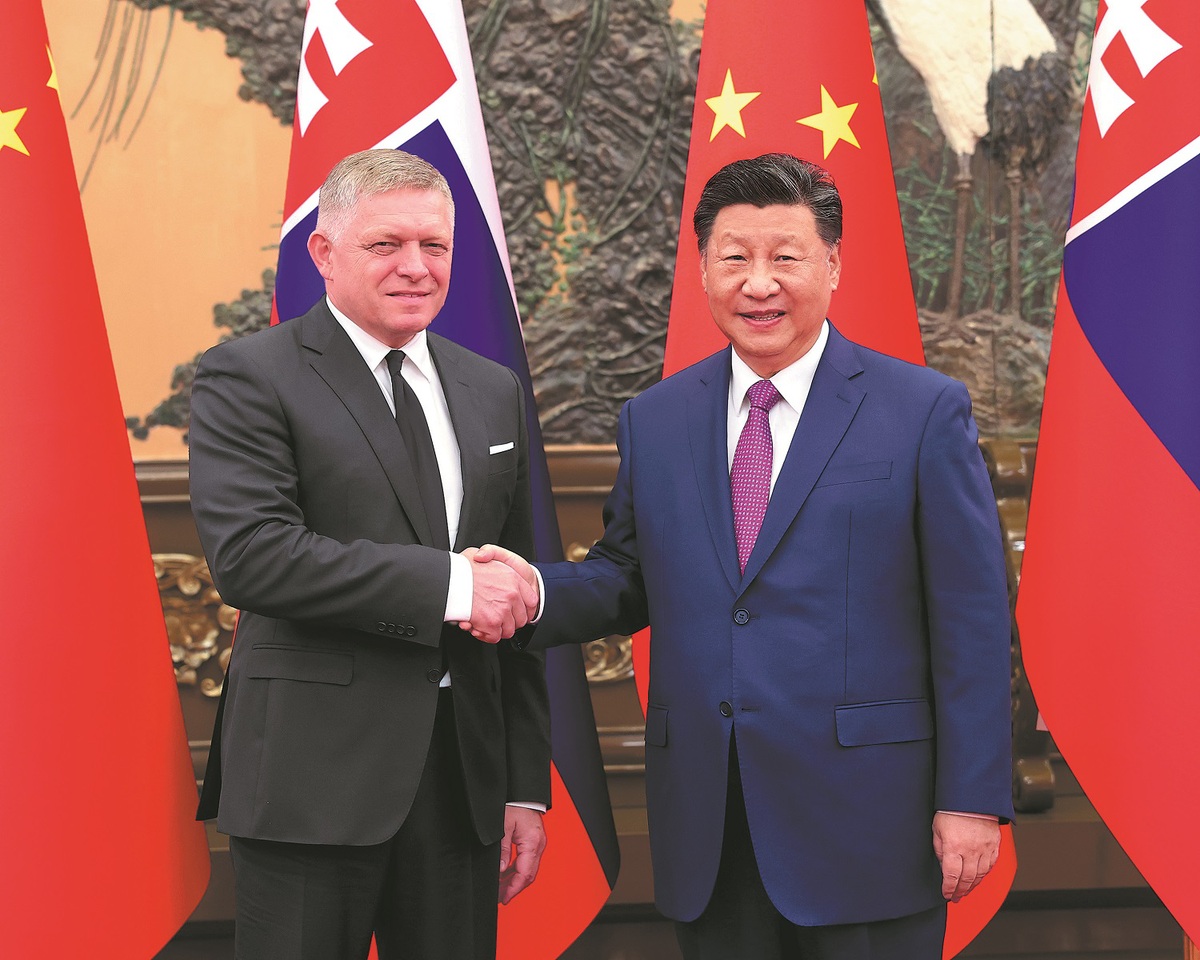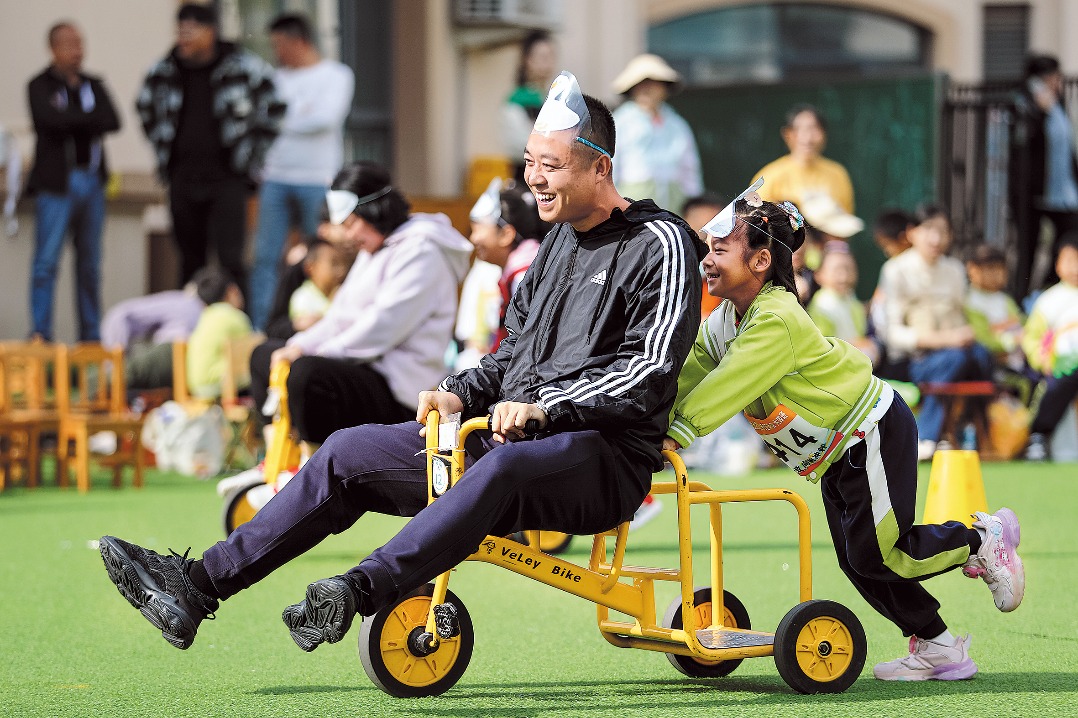China, Slovakia elevate ties
Nations pledge to upgrade 75-year bilateral relations


President Xi Jinping and visiting Slovak Prime Minister Robert Fico decided on Friday to elevate bilateral ties to a strategic partnership as China and the Central European country are committed to upgrading their 75-year-old relationship with enhanced mutual trust, expanded practical cooperation and closer people-to-people exchanges.
When meeting with Fico at the Great Hall of the People in Beijing, Xi lauded the flourishing development of the China-Slovakia traditional friendship, saying that bilateral cooperation across various fields has yielded fruitful results benefiting the people of both countries.
Fico, accompanied by a large delegation of ministers and business representatives, started a six-day official visit to China from Thursday.
He will also visit Hefei, Anhui province, to tour the production facilities of an electric vehicle battery component manufacturing company, and Shanghai for the opening of the 7th China International Import Expo, aiming "to deepen Slovak-Chinese bilateral relations and enhance mutual economic cooperation", according to the Slovak Prime Minister's Office.
Calling Fico "an old friend and good friend" of the Chinese people, Xi said: "I believe that with our joint efforts, the China-Slovakia relationship will enter the fast lane, open up a new chapter and move toward a higher level."
Bilateral trade between China and Slovakia has significantly increased in recent years, with the trade volume growing from $3.75 billion in 2010 to $12.15 billion in 2022, according to the Foreign Ministry. Slovakia is now China's fourth-largest trading partner in Central and Eastern Europe, while China is Slovakia's largest trading partner outside the European Union.
To expand practical cooperation, Xi called on the two sides to strengthen bilateral cooperation in such areas as new energy, transport and logistics, as well as infrastructure construction. China encourages capable Chinese enterprises to invest in Slovakia and Slovak companies are welcome to explore the Chinese market, he said.
The Chinese president encouraged the two countries to carry out dialogue among political parties, local communities, youth, think tanks and media outlets, and better utilize the Confucius Institute and other platforms for closer people-to-people exchanges.
Xi also announced China's decision to grant a 15-day visa-free entry policy to Slovak citizens.
Fico's visit came after the European Commission finalized its decision to impose additional tariffs on Chinese-made electric vehicles, which Slovakia voted against.
Noting that next year marks the 50th anniversary of China-EU diplomatic relations, Xi said this relationship should reflect the maturity and stability it deserves, expressing his hope that EU institutions will keep positioning China as its partner, adopt an active and pragmatic China policy, effectively manage differences, and avoid politicizing economic and trade issues.
Fico said that his country firmly pursues the one-China policy, which serves as the foundation of China-Slovakia cooperation and opposes any interference in other countries' internal affairs.
The two leaders also exchanged views on the Ukraine crisis. Xi, who reiterated China's consistent position on the Ukraine issue, expressed appreciation for Slovakia's objective, rational and fair approach and welcomed Slovakia and more like-minded countries to join China in playing a positive role for promoting peace and dialogue.
Fico praised China's fair, objective and constructive position, saying that Slovakia is willing to join the group of Friends for Peace to address the Ukraine crisis and work with China on promoting a political settlement.
Shortly before departing for Beijing, the Slovak prime minister had said that, "China is becoming a decisive world player and I even think that settling the dispute in Ukraine will not be possible without China's active cooperation."
On Friday, Premier Li Qiang and Zhao Leji, chairman of the Standing Committee of the National People's Congress, also met separately with Fico in Beijing.
Li and Fico witnessed the signing of multiple cooperative documents covering areas including transportation, trade and the economy, and culture and tourism.
Cai Ge, the Chinese ambassador to Slovakia, said that Fico's visit will be extremely significant in strengthening understanding, deepening mutual trust, expanding practical and mutually beneficial cooperation, and fostering a future-oriented friendship.
Noting that it is the first visit by a Slovak prime minister to China in the past 17 years, Cai said the trip will have a milestone significance in the China-Slovakia relationship that helps bring bilateral ties to a new level.
In 2007, Fico visited China for the first time as Slovak prime minister. He was appointed prime minister for the fourth time in October last year.























